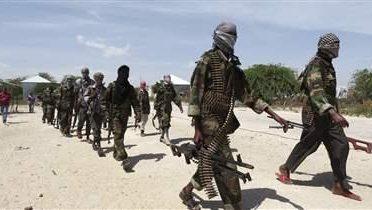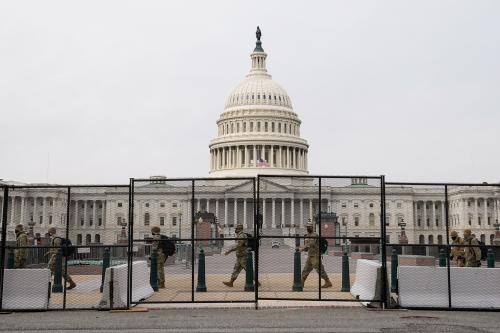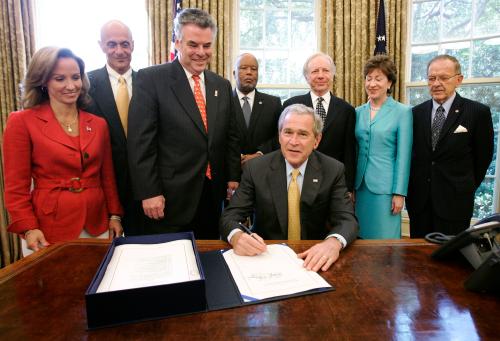Editor’s Note: The following is a Campaign 2012 policy brief by Benjamin Wittes and Daniel Byman proposing ideas for the next president on America’s counterterrorism efforts. Stephen Grand prepared a response arguing that the next president must seize the Arab Spring as a historic opportunity to prove to the region that the United States is a meaningful and trustworthy partner. Rebecca Winthrop and Kevin Watkins also prepared a response arguing that the United States must put poverty, including strategies for positive youth development, at the center of the nation’s wider national security agenda.
At the dawn of the Obama administration, counterterrorism seemed to be one of the new president’s biggest weaknesses. Unlike the preceding administration, which repeatedly emphasized that it was keeping America safe from a post-September 11 homeland attack, Barack Obama promised during the campaign to “restore the rule of law” and “close Guantánamo,” in other words, to smooth off the hard edges of the War on Terror. Within months of taking office, Obama found his various moves in this direction thwarted by opponents who painted the new president as weak. Two near-miss terrorist attacks domestically—one on an airplane, the other in Times Square—accentuated the political problem. By the time the president had completed his first year in office, counterterrorism ranked among his political vulnerabilities.
What began as weakness, however, has over time morphed into strength. As a result, Obama goes into the 2012 campaign enjoying far higher public confidence in his pursuit of terrorists than on other matters. He has developed a strong operational record both in overseas counterterrorism and against domestic jihadists. He has made bold decisions that have enraged his political base. He has also been lucky. And barring a successful strike on the homeland in the coming months, he will have turned counterterrorism from a sword wielded against him to a sword in his own electoral hand.
Unfortunately, Obama’s operational successes have not been matched by comparable success in establishing a durable legal framework for counterterrorism activities. Despite his victories against al Qaeda overseas, the president finds his position on counterterrorism in the eyes of Congress growing steadily worse. Some of this trouble reflects frankly unreasonable policy constraints that Congress has attempted to slap on executive operational flexibility. Some of it, however, reflects poor and timid leadership on the part of Obama, who has steadfastly refused to invest his political prestige and capital in the legislative politics of counterterrorism. As a result, the next president will face a significantly improved strategic climate with respect to America’s principal terrorist enemy but also a set of thorny policy disputes with the legislature—which seems bent on pushing approaches that no president, Republican or Democrat, is likely to embrace.
The next presidential term should not, and probably will not, see a radical departure from the current framework of counterterrorism policy. Whether Obama or a Republican is at the helm, the United States must continue with its robust domestic law enforcement alongside vigorous covert and open targeting of al Qaeda–affiliated groups in Pakistan, Yemen, and elsewhere. It must also maintain and expand work with cooperating intelligence partners in other nations.
But important changes should be entertained as well. In particular, the next president should talk more publicly about the legal and policy parameters of the fight; settle relations with Congress on counterterrorism matters, and establish a set of understandings with the legislature regarding available counterterrorism tools; and end the standoff with the legislature over whether to close Guantánamo, accepting the fact that noncriminal detention is not going to end and that the naval base is as a good a site as any at which to conduct it under appropriate judicial supervision.
The Obama Record
Obama has made an undeniably strong impact in operational counterterrorism. His presidency has successfully targeted major al Qaeda leaders abroad—most famously, the previously elusive Osama bin Laden. The killing of bin Laden was a significant blow to al Qaeda. Beyond bin Laden’s operational role—which terrorism expert Bruce Hoffman describes as “active . . . at every level of Al Qaeda operations: from planning to targeting and from networking to propaganda”—his survival was a form of successful defiance that his followers attributed to God’s protection. The successful U.S. attack diminished the aura of divine protection, not only for bin Laden, but also for his cause. His successor, Ayman al-Zawahiri, may be an effective operator, but he has far less star power than bin Laden did—and thus less ability to inspire. Al Qaeda will find it hard to recruit and raise money without bin Laden to lead its cause.
In the past few years the organization has also suffered steady losses from U.S. drone strikes. The drone campaign began under President George W. Bush and increased in intensity near the end of Bush’s time in office. Under Obama, however, it went on steroids. The Long War Journal reports that the United States has killed hundreds of Taliban and al Qaeda figures, along with dozens of civilians. These individuals have been far less prominent than bin Laden, but many had skills that are in short supply and difficult to replace. Al Qaeda struggles to find seasoned and able new leaders, and even when successful, it takes time to integrate them into the organization. Even more important, though harder to see, al Qaeda lieutenants must limit their communications to prevent the United States from eavesdropping and determining their location for airstrikes. They also reduce their circle of associates to avoid spies and escape public exposure—but then become far less effective as leaders as a result. This makes it harder, though not impossible, for them to pull off sophisticated attacks like September 11, which require long-term planning and management.
With large numbers of their lieutenants eliminated, terrorist groups are often reduced to menacing bumblers. There may still be thousands who hate the United States and want to take up arms, but without bomb-makers, passport-forgers, and leaders to direct their actions, they are easier to disrupt and more of a danger to themselves than to their enemies. Some observers both inside and outside of government now believe that the core of al Qaeda is on the point of collapse.
To be sure, regional affiliate groups and others that work closely with al Qaeda—al Qaeda in the Arabian Peninsula (AQAP) and the Somali al Shabab, in particular—have grown in importance. These groups are dangerous not only because of their hostility to U.S. allies in their theaters of operation, but also because, in AQAP’s case in particular, they have attempted sophisticated attacks on the U.S. homeland. The Shabab poses additional concerns: several dozen Americans of Somali origin have gone to Somalia to fight for the organization and could prove to be valuable recruits for jihadist organizations wanting to conduct a terrorist attack on the U.S. homeland.
Nonetheless, American actions have taken a serious toll on affiliate groups too—and thus have materially improved American domestic safety. Most significant, the drone strike that killed Anwar al-Awlaki, the American-born cleric who helped lead AQAP’s activities from its haven in Yemen, did far more than eliminate yet another senior terrorist leader. Awlaki, more than other al Qaeda leaders, posed an unusual and multifaceted danger to the U.S. homeland. From his perch in Yemen, he and his fellow AQAP members had the operational freedom to plan sophisticated attacks on the United States. And unlike other affiliates, which tended to focus on their own localities and regions, AQAP repeatedly sought to hit the United States directly. Moreover, Awlaki tried to inspire Muslims in the United States and the West to take up arms. As an American, he was familiar with U.S. culture and values and knew how to use them to al Qaeda’s advantage far better than other figures.
The Obama administration deserves credit for these accomplishments, but it should be remembered that they enjoyed broad bipartisan support and probably would have occurred regardless of who was in the Oval Office. Much of the intelligence and military support behind the more aggressive campaign took shape near the end of the Bush administration, establishing a foundation the Obama administration was able to build on. Had a Republican been in office, drones would likewise have been used to target al Qaeda without the assistance of what is, at best, a highly unreliable ally in Islamabad.
On the domestic front, the Bush administration’s success in preventing significant attacks on the homeland after 9/11 came to a tragic end when Major Nidal Malik Hasan shot thirteen Americans at the U.S. military post in Fort Hood, Texas. Furthermore, the current administration’s record in protecting the homeland would look far less attractive today had two major terrorist operations—the Times Square bombing and the Christmas Day 2009 effort to bring down a commercial airliner—not failed in large part as a consequence of good luck. At the same time, the Obama administration has seen significant successes too, with authorities breaking up a number of major plots. Good intelligence cooperation helped foil a 2010 AQAP attempt to bomb two cargo planes headed for the United States. Also in 2010, the Obama administration managed to uncover the planned bombing of several New York targets by Najibullah Zazi, an Afghan by birth but a legal resident of the United States. Unlike the many unskilled attackers arrested in the past, Zazi admitted he was trained in Pakistan and instructed to carry out a suicide bombing. In the past few years, the Federal Bureau of Investigation (FBI) has become so adept at breaking up incipient terrorist cells—and has done so at such early stages of planning—that it has become difficult to evaluate the seriousness of many of the alleged plots, whose participants often manage to do little more than conspire with undercover agents posing as terrorists. Nonetheless, the large and growing number of domestic arrests and prosecutions suggests at least some problem of domestic radicalization, despite law enforcement’s high degree of effectiveness.
In sharp contrast to the Obama administration’s operational success, its efforts to develop an agreed-upon legal framework for counterterrorism have by and large failed. Although early on it worked with Congress to rewrite aspects of the Military Commissions Act, the president’s promise to close the detention facility at Guantánamo Bay has foundered on congressional opposition. Friction with the legislature has persisted over transfers from Guantánamo, the proper forum for trying terrorist suspects, the use of the domestic criminal justice system as a counterterrorism tool, the availability of alternative detention facilities in the United States, and whether the 2001 congressional Authorization for Use of Military Force (AUMF) needs updating. President Obama has failed to present Congress with an affirmative agenda regarding counterterrorism legal issues and thus has lost control of the legislative debate. As a result, he has found himself in repeated standoffs with Congress, which in 2011 mounted a serious effort to compel the use of military detention for terrorist suspects, even for those arrested domestically, and to require that trials take place in military commissions.
This turn of events is quite surprising, for initially Obama seemed eager to place American counterterrorism authorities on a more solid legal footing by enshrining them in statutory law and thereby both constraining and legitimizing their use. In a major address at the National Archives in May 2009, he noted of detention authorities:
Our goal is to construct a legitimate legal framework for the remaining Guantánamo detainees that cannot be transferred. . . . If and when we determine that the United States must hold individuals to keep them from carrying out an act of war . . . my administration will work with Congress to develop an appropriate legal regime so that our efforts are consistent with our values and our Constitution.
Within a few months, however, the administration had dropped that particular ball, making clear that it did not mean to seek legislation after all. When the administration finally announced the review process for Guantánamo detainees, it acted by means of an executive order, and until Congress forced the administration’s hand in the 2012 National Defense Authorization Act (NDAA), the Obama team specifically eschewed public requests from members of Congress to proceed legislatively.
The Republican Critique
The Republican candidates for president expressed a somewhat schizophrenic opposition to Obama’s counterterrorism record. One of the mainstays of Republican campaigning is accusing Democrats of not being tough enough on America’s enemies, but that’s an awkward line of attack against a president who has actually ramped up drone strikes, increased the U.S. troop presence in Afghanistan, sent special forces into Pakistan to kill bin Laden, and targeted an American citizen with a drone. As a result, the candidates combined praise for Obama’s operational successes with disdain for his allegedly soft counterterrorism policies in another.
Ron Paul aside, the GOP candidates all made clear that they had no problem with Obama’s aggressive targeting of the enemy. In one debate, Texas governor Rick Perry said one thing he agreed with was that Obama “maintained the chase and we took out a very bad man in the form of bin Laden.” During another debate, Newt Gingrich, Michelle Bachmann, and Mitt Romney all spoke up on behalf of the al-Awlaki operation. While the president’s targeted killing raises ire in his own political party, it induces no similar anxiety among politicians on the other side of the aisle. Indeed, the president’s operational successes have significantly blunted the power and simplicity of the Republican case against his counterterrorism record.
The Republican candidates instead criticized several of Obama’s policy judgments that in their view signal a retreat from the war paradigm for confronting the enemy. In particular, they faulted Obama for terminating the CIA’s High-Value Detainee program and the enhanced interrogation techniques authorized within it. Mitt Romney, Rick Perry, Newt Gingrich, and Herman Cain all promised to authorize techniques that exceed those permitted by the Army Field Manual. Some explicitly promised to permit waterboarding, which the CIA used on three detainees but was then discontinued by the Bush administration. In addition, the major Republican candidates promised to keep Guantánamo Bay up and running and complained of Obama’s continued—if lackluster—commitment to shuttering it. Perhaps most important, all the candidates attacked Obama’s willingness to use the domestic criminal justice system to handle terrorist suspects, arguing that terrorists don’t deserve the constitutional rights the system affords.
Little, if any, evidence supports the notion that U.S. interrogations have been hampered by rules against waterboarding, and the Republican hostility to federal court terrorist trials flies in the face of considerable evidence indicating that the federal courts—at least for now—offer the most effective means of neutralizing certain types of terror suspects. Indeed, the Bush administration used multiple trial venues, including civilian courts, for terrorism cases. That said, on some matters, the GOP critique has merit.
In the case of Guantánamo, for example, the Republican candidates put their collective finger on a real issue: Obama has promised to close the facility, but he has not identified an alternative site for the long-term detention of law-of-war detainees that Congress will let him use. Nor has he effectively countered congressional opposition to his position. As the United States disengages from the Afghanistan conflict, it will not be able to count on the continued use of the Bagram air base for detentions; indeed, the detention facility at Bagram is being transferred to Afghan control and is already off limits for non-Afghans captured out of the theater of war in the future. Although the GOP commitment to Guantánamo may smack of posturing over a site that has attained an odd symbolic importance, there is a real concern that if plans to transfer such detainees to their home countries founder, Obama’s refusal to bring new detainees to Guantánamo will leave a gap in U.S. capabilities.
In addition, as Congress urged last year, Mitt Romney is pushing for the AUMF to be updated—an issue of genuine substance and importance. The AUMF, Romney accurately says:
is only a few sentences long, its language is quite general, and it has not been updated since its enactment. While the statute clearly authorizes force against al Qaeda and the Taliban, it does not directly address what other groups might also be covered. Recent administrations have interpreted the AUMF expansively to include those who substantially support forces associated with al Qaeda and the Taliban, but as more time passes, the connections between those two groups and the terror threats we face will become more and more attenuated. These new terror groups—like al-Shabaab in Somalia—may share al Qaeda’s ideological objectives but lack close operational ties with the larger network.
The Obama administration has looked askance at efforts to modernize the AUMF, although the NDAA did enshrine its detention authority in law, but Romney’s point has considerable force. In fact, it identifies the administration’s chief shortcoming in this area: its failure to seriously engage Congress over the legal framework for tough counterterrorism actions.
Counterterrorism Policy in the Next Presidential Term
The next president—whether that is Obama or one of his Republican challengers—should not, and likely will not, alter the twin strategic pillars of American counterterrorism policy put in place in recent years: robust law enforcement efforts domestically coupled with vigorous covert and military targeting of al Qaeda’s core and affiliated groups in Pakistan, Yemen, and elsewhere. U.S. counterterrorism policy must center on fighting enemy groups in Pakistan and Yemen despite the death of bin Laden and al-Awlaki. These two countries provide terrorist groups like al Qaeda with the secure havens they need to maintain their strength and remain a deadly danger. Because both countries pose this danger and are also fitful counterterrorism partners, the United States must continue an aggressive campaign—using both drones and special forces—of targeting the enemy with lethal force. Conservatives may complain about using law enforcement to handle terrorism cases, but no plausible alternative to the criminal justice system exists for the volume of serious cases the FBI and federal prosecutors are overseeing in the homeland. For all the noise on the political Left about abandoning the war and covert action paradigms and on the political Right about the exclusivity of the military detention and trial models, no prospect for either exists—no matter who is president.
At the same time, many U.S. counterterrorism successes occur daily, and quietly, in cooperation with allied intelligence and law enforcement services, which arrest and detain suspected terrorists around the globe. The United States must make every effort to maintain and even expand such efforts: they usually incur little cost economically and diplomatically, yet are highly effective. Such cooperation often means working under tension with unsavory and undemocratic partners in places like Jordan or Bahrain, where the United States might be contributing to the repressive capacity of a regime in the name of counterterrorism even as that regime moves to curtail democratization, at times brutally, in a way the United States opposes. Should the forces of democracy survive and take over, the United States will have to forge new relationships with the often-suspicious replacements. None of this will change whether a Republican or a Democrat wins the next election.
For that very reason, the next administration must make the parameters of the American consensus on the parameters of the fight against terrorism clearer to the public. For a start, it might continue addressing the following questions: Under what conditions will the United States kill terrorist leaders? How many civilian deaths are acceptable when it does? What sort of intelligence evidence is necessary before it acts? The United States has taken important steps to lay out these criteria without revealing sensitive intelligence information or methods and in so doing improve the public and elite debate on counterterrorism and thus make overall policy more robust. The next administration should do more still in this regard.
Above all, the next administration must settle relations with Congress on counterterrorism matters, to establish a set of working understandings with the legislature regarding the legitimacy of counterterrorism options that the executive needs to keep on the table. Some of what Congress has wished to do—reauthorize and update the AUMF to describe the war America is now fighting, rather than the war it set out to fight more than a decade ago—is quite reasonable in principle, though the specific proposals may require considerable work. Some actions of Congress have been frankly destructive, particularly its efforts to impede the use of the domestic criminal justice system, mandate military detention, and encumber the transfer of detainees from military custody. The next president will have to engage more constructively with the legislature than Obama has to date, working with members to improve and polish ideas with promise and stop proposals that restrict executive flexibility in a conflict that requires flexibility.
One key to building such a relationship with the legislature may be to take a new approach to the less-than-important subject of what to do about the detention facility at Guantánamo Bay. Guantánamo has played an outsized role in the Obama administration’s paralysis in connection with the law on terrorism. Obama has continued to mouth his commitment to closing Guantánamo but has not been willing to exercise the powers of the presidency to prevent his policy from being stymied. His continuing emphasis on closing the facility also feeds the perception among conservatives that he is opposed to using military authorities to neutralize terrorists.
The next president should approach Guantánamo in a very different way from that of either the Bush or the Obama administration. For Guantánamo today is not the Guantánamo of the early Bush administration—a detention site chosen for lying beyond the reach of the U.S. courts. It is now a unique detention site for almost the opposite reason. Alone among facilities used by the military to detain enemy forces in the war on terror, detentions at Guantánamo are supervised by the federal courts in probing habeas corpus cases. Detainees there, unlike those at any other detention facility, have access to lawyers. Their cases are followed closely by the press, and many hundreds of journalists have been to Guantánamo. What is more, Obama’s executive order—and now the NDAA—have created a significant new review process for those detainees who have lost their habeas cases. In other words, while everyone—including Obama—was calling for Guantánamo’s closure, it evolved into a facility that offers a far more attractive model of how long-term counterterrorism detention can proceed than do the other sites the United States has used.
Instead of fecklessly continuing to argue for the closure of Guantánamo, the president should treat it not as a symbol of excess, lawlessness, or the evasion of judicial review, but as a site of detention under the rule of law. Huge strides have been made in this direction under both the Bush and Obama administrations. The next president should actually seek to expand the facility by bringing to Guantánamo and subjecting to its processes all counterterrorism detainees captured in the future or held currently anywhere in the world today that are to be kept in military detention for a protracted period of time. This will ensure that all detainees whom the United States wishes to hold because of something more than a role in local theater operations receive the benefit of the due process norms that have been established at Guantánamo. This approach will solve another problem as well: that of where to detain future captives once the military no longer has access to facilities in Afghanistan. And it will greatly strengthen the president’s hand in seeking from Congress flexibility in handling detainees both at the site and elsewhere.





